History
| Year | Host | Winner | Number of teams |
| 1960 | France | Soviet Union | 4 teams |
| 1964 | Spain | Spain | 4 teams |
| 1968 | Italy | Italy | 4 teams |
| 1972 | Belgium | Germany | 4 teams |
| 1976 | Yugoslavia | Czechoslovakia | 4 teams |
| 1980 | Italy | Germany | 4 teams |
| 1984 | France | France | 8 teams |
| 1988 | Germany | Holland | 8 teams |
| 1992 | Sweden | Denmark | 8 teams |
| 1996 | England | Germany | 8 teams |
| 2000 | Holland-Belgium | France | 16 teams |
| 2004 | Portugal | Greece | 16 teams |
| 2008 | Austria-Switzerland | Spain | 16 teams |
| 2012 | Poland-Ukraine | Spain | 16 teams |
| 2016 | France | 24 teams |
European Championship
The history of the continent’s activity
The European Championship, known also as the continent’s facing , is one of the most important football events of European or world football. This is for some reason. Firstly, football was born in this continent. In Europe is played qualitative football regarding the annual activities of the clubs, where the most important players of the world are part of these clubs. Due to the increase of the quality of the game and the development of the game in Europe , the European Championship has increase its weight, making itself more important regarding the sportive aspect and the marketing aspect , which can be proved by the doubled figures. From a modest tournament with the participation of only 4 teams in 1960, now in France it will have 24 finalist teams. A record number. Through a fast navigation in the history of the European championships , we aim to bring to the reader the atmosphere that will accompany until next June , when we will follow the emotions of the first participation in such an event of the Albanian National team.
The Trophy and the medals of the European Championship
The Henri Delaunay Trophy, which is awarded to the winner of the European Championship, is named in honor of Henri Delaunay, the first General Secretary of UEFA, who came up with the idea of a European championship but died years prior to the first tournament. The trophy was created by his first son , Pierre. The trophy is awarded to the winning team for four years to keep , until the next tournament , and of course after making a copy of it. For the 2008 tournament, Trophy was remodeled, making it larger, as the old trophy was overshadowed by UEFA’s other trophies such as the Europa Champions League , UEFA Europa League etc. The new trophy , is made of pure silver. The old marble plinth has been replaced with silver , in order to be more stable. Once , the names of the winning countries were engraved in the old plinth , but now with the new trophy they are engraved on the back.
The players and coaches of the winning teams and runner-up teams are awarded gold and silver medals. The runner-up team receives a plaque. Though there was no third place playoff, UEFA decided in the 2012 edition to award the semi-final losers (Germany and Portugal) bronze medals for the first time. The ‘small’ final is held only in the first six championships. After Euro’80 , organized in Italy , the final for the third and fourth place was never played again.
Format changes of the activity
Until 1980, only four teams competed for the finals of the European Championship. In the European Championship of Italy , until 1996 , 8 teams competed in the final phase. After the new developments in the beginning of 1990 (after the collapse of the Soviet Union and Yugoslavian republic ) new federation begun to take shape. For the first time in the final phase of a European Championship , organized in England in 1996, 16 teams participated. After three decades , in the European of 2016 that will be held in France, will see for the first time 24 teams participating in the final phase.
The decision for the expansion of the European championship of 2016 has been taken before the beginning of the European Championship of 2008. Such a decision , found the disapproval of 2 big federations , that of Germany and England. But despite this , an agreement was achieved for the expansion of the format. The high quality that the finals of 2008 , organized in Switzerland and Austria , produced showed that the decision for the expansion of the format was the right one. During the finals of the last two championships , the quality of the game has increased , and beside the classic football teams of the continent , other teams have made performances that have increased significantly their quality of game. The fact that in the forthcoming European Championship of France , teams that represent small countries approves the previous statement. Countries such as Albania , Iceland and Wales are a novelty for the new championship. In the eliminatory phase, except San Marino and Gibraltar , all the other teams are capable to produce surprises , even though they are Luxemburg, Faroe Iceland and even Lichtenstein. This shows the huge development of football.
The organization in more than a country
The immense desire to organize the European Championship, made that a lot of countries throw their candidature to organize an European Championship. At the beginning of the new century , for the first time an European Championship was held in two countries at the same time. That was the European championship of 2000 that was organized in Belgium and Holland. The opening game was held in one country ,and the final in the other one , according to the system. The next championship , turned to the traditional way , being organized only in Portugal. But the next 2 championships after that were organized in two countries ,simultaneously. In 2008 in Austria and Switzerland and after 4 years in Poland and Ukraine. Despite the difficulties created by this way of organization regarding the movement of the football players and especially of media and fans (noted mostly in the last European Championship) this formula is well received and considered successful .
The remarks for difficulties of the journey , caused by the distance between two big countries like Poland and Ukraine , were not taken into consideration. On the contrary , after returning the classical formula of organizing the championship in only one country ( France 2016) , it is decided that the next European championship of 2020 , be organized in different countries , in order to give this activity an all-inclusive format , as a chance to satisfy many countries. Despite the offers made by Turkey , the trio Ireland-Wales- Scotland and the duo Azerbaijan-Georgia for the Euro 2020, a decision was take for the change of formula in December 2012. The tournament will be held in 13 countries , like never before. This was the latest structural change that was made to the organization of the European Championship.
Hot numbers of the European championships
1. The first European is won by the Soviet Union. The special feature was not the victory of the Soviets , but their star player , different from other teams of that time or even today that have a forward for their favorite player , the soviets had a goalkeeper. Lev Jashin , whose fame crossed not only the Soviet Union but the entire communist world and was made famous and popular in the entire world. That’s why he won the Ballon d’Or , being the only goalkeeper to have won such a trophy.
2. In the third European Championship , an unprecedented event occurred. Greece was eliminated in the first round because it did not accept to play against Albania ( as an excuse they mentioned the absurd Law of War with Albania).
3. In the third European Championship another feature happened , regarding the final of the tournament , that was played between Italy and Yugoslavia. To declare the winner , two final matches were played. The first one ended in a draw and after extra time UEFA decided that after two days the final should be played again. In the other final , Italy was crowned winner after winning 2-0.
4. The final of the European championship 1989 was the first one that required the penalty shootouts. Germany participated in this event as the champions in charge of the European of 1972 and World Champions of 1974 and played gains Czechoslovakia. In order to determine the winner the penalties were shot. Uli Hoenes lost a penalty for the Germans and on the other side Panenka executed a perfect shot. This shot entered in the history of football.
5. The European championship of 1988 , won by Holland , was the last one of UEFA with few members. Three years later the process of collapse of Soviet Union and Yugoslavia started , a process that foresaw the creation of other states and new federations and national football teams. Today the number is 54.
6. Denmark was the winner of Euro 1992, after beating Germany in the finals. The entire adventure of the Danish team , seems like a Cinderella story. The Danes were not qualified for the final and they were enjoying their vacations on the beach. But a sudden decision of UEFA brought them back in the field. Yugoslavia was expelled from the competition (soon was to be divided) due to the Yugoslav war. It’s place was filled by Denmark, which went beyond predictions at the end of the activity, by totally deserving the win. Nobody could predict such a thing.
7. For the first time in 1996 , in the European championship organized in England, the Golden Goal was applied. The rule was that the team who scored the goal in extra time , wins the game. After the scoring moment the game ended. Germany played the final against the Czech Republic. It was a repetition of the final of 20 years ago , but with big changes in both teams. Germany was not the Federal Republic of Germany and the Czech Republic was divided and was not Czechoslovakia anymore. Germany won the trophy with a ‘Golden Goal’ scored by Bierhoff.
8. The European championship of the new century was won by France. In 2000 , the competition was organized in two countries. Italy and France were in the final , and to decide the winner , extra time was needed. At the last moments when Italy was ahead by 1-0 , France scored the equalizer. Extra time was needed. The French scored and the match terminated. The killer ‘Golden Goal ‘ was still in play. This was the last tournament to use the ‘Golden Goal’. It was not applied anymore in other activities.
9. After four years the European championship was held in Portugal. The small country triumphed over Spain , which was the main candidate for organizing such a huge activity. Portugal started the European campaign , aiming to be the host country , and going for the title as well. Everything went well , until the final with Greece. The small country form the Balkan , beat Portugal 1-0 , thus winning the European Championship title. Before the start of the competition , the win of Greece was 150-1.
10. Two of the last championships of 2008 and 2012 , were organized according to the formula of 2 host countries. The first one was held in Austria –Switzerland and the second one in Poland and Ukraine. In both competitions the winner was Spain. Spain became the first team in the history of European Championships to win two times in a row. It also went for the World champion title in 2010.
EURO Facts & Figures
The UEFA EURO is ranked on the 3rd place concerning the economic importance of global sport events. First are the Olympic Games, second the FIFA World Cup.
24 Teams
There have never been so many teams joining the final round of an UEFA EURO. With the extension Michel Platini thanked the smaller nations who supported him at the last election. What a subtle irony that he will be missing at his object of prestige because of his suspension by the FIFA.
51 matches
Because oft he extension to 24 teams there will be held 20 matches more then 4 years ago. The EURO 2012 in Poland was finished after 31 games.
27 millions of Euros
That’s the premium-amount the winner gets. 3,5 mio. more than in Poland 2012. 300 mio.€ alltogether will be distributed to the 24 participating teams. Each participant will get 8 mio.€., 1 mio.€ per victory, once a team reaches the last 16, the’ll get additional 1,5 mio.€.
6.500 Volunteers
The volonteers of the EURO 2016 are hired in 145 countries. 64% men, 36% women want to be part of one oft he most important spectacle.
6 finals
The German team already partcipated 6 times in a final of an UEFA EURO. They won the tournaments 1972 (3:0 against the Sowietunion), 1980 (2:1 against Belgium) and 1996 (2:1 after a Golden Goal against the Czech Republic).
They lost the finals in 1976 (3:5 in the penalty shoot out against the Czech Republic), in 1992 (0:2 against Denmark) and in 2008 (0:1 against Spain) in Vienna.
4,686 millions of Euros
That’s the huge amount of investments to set up the EURO. 1,7 billions were invested in the football infrastructure, mostly in the modernisation of the stadions. Lille, Lyon, Bordeaux and Nice have been built completely new.
7,93 millions of Facebook-followers
522.000 have been counted on Twitter.
18 months
Adidas invested one year and a half in the development oft he official ball of the EURO 2016. It is named „le Beau Jeu“, the best elements of the „Brazuca“ (official ball oft he FIFA World Cup 2014) have been the base. Adidas worked and improved the bite and the flight quality. Gareth Bale, a former star of Wales, leaded the expert team.
2,508.500 seats
During the 31 days oft he UEFA Euro more than 2 and a half million visitors can join the games live in the French stadions. Somehow the quotations calculate only with expected 95% of occupancy.
842 mio.€ should be spent, 593 mio.€ by the fans of the joining countries. The „Centre de Droit et d’Économie du Sports“ (CDES) expects a spending of 500€ by each foreigner.
9 goals
…was the highest score ever shooted at a UEFA EURO match. It was the semifinal in 1960, Yugoslawia won 5:4 against France. 40 years later Yugoslawia lost with the highest difference: 1:6 aganist the Netherlands in the quarter-final.
16 matches
The French team player Lilian Thuram and the Dutch Teamplayer Edwin van der Sar played 16 matches at EURO tournaments. There is no other player who joined so many games. Thurman and van der Sar joined in 1996, 2000, 2004 and 2008.
895€
That’s the most expensive official ticket price at the final of the EURO 2016. The lowest are available at 25€ during the group-stage.
107.790 people
voted in the survay about the official mascot. 48,8% chose the winner, „Super Victor“: a tiny small nr 16 football-kicker in a blue dress with a red cape with a big smile.
67 seconds
It never happened that a goal was shot during the first minute. The fastest was shot after 67sec. in 2004 by the Russian teamplayer Dimitri Kiritschenko aganist Greece who won lateron in the final.
4 debutants
Albania, Island, Northern Irlandand Slowakia join the EURO for the first time. Austria and the Ukraine are qualificated also for the first time. They participated in 2008 (Austria) and 2012 (Ukraine) because of being host.
552 players
Each oft he 24 teams can nominate 23 members, so alltogether there will be 552 players.
1.700 visitors
At the semifinal 1972, where the Sowietunion played against Hungary, only 1.700 visitors were interested to follow the match live in the stadion in Brussels.
The maximum of visitors joined in the semifinal in 1964 in Madrid: 125.000 fans saw the match of Spain against Hungary. Spain won 2:1 in the prolongation.
3 red cards
In the semifinal in 1976 the red card was shown 3 times, the maximum in all the UEFA history. 1 against the Czech Republic Jaroslav Pollak), 2 against the Netherlands (Johan Neeskens and Willem van Hanegem).
18 matches
1960 the Sowietunion only had to play 4 matches to become European champion. In 2012 Spain had to do much more effort: after 12 matches in the qualification stage they needed other 6 matches at the EURO in Poland /Ukraine. In 5 matches they did not receive a goal.
Russia was crownded in 1960 to be the first European Champion.
Since the first tournament 9 nations could celebrate this title around the Henri-Delaunay-Cup. The titleholder Spain and Germany are on the top, each nation won three times.
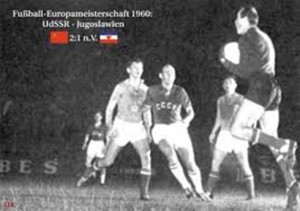 1960 FRANCE
1960 FRANCE
EUROPEAN CHAMPION – RUSSIA
17 teams participated in the qualification round, where by the ko-system 4 finalists were determined. The host country France was decided when the 4 finalists were set. Russia won against Yugoslawia 2:1 in prolongation.
Albania did not participate.
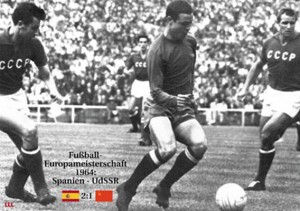
1964 SPAIN
EUROPEAN CHAMPION – SPAIN
The qualification phase in 1964 was already much bigger than 4 years ago: 29 countries joined. The hosting country-teamplayers captured the victory for themselves by beating the regnent champion of the Sowjet Union.
It should remain the last title of the „Furia Roja“ until 2008.
Albania joined for the first time the qualification but lost against Denmark in the stadium of the last 16.
1968 ITALY
EUROPEAN CHAMPION – ITALY
For the first time the qualification round was organized in groups. The hosting country was once again the winner, winning really very lucky after tossing a coin against the Sowjet Union in the Semifinal. Italy had to play the final twice because after a remis after the prolongation against Yugoslawia, the match was repeated and Italy won 2:0.
Right after this tournament the penalty shoot-out was implemented.
Albania was not qualified, they lost against the finalist Yugoslawia.
1972 BELGIUM
EUROPEAN CHAMPION – GERMANY
The defending champion and favorit team Italy lost against Belgium already in the quarter final, so the way to the victory was open for Germany, winning their first championship against the Sowiet Union 3:0.
Also Albania had to admit defeat to Germany, because of loosing in the qualification against the German team, Albania could again not participate.
1976 YUGOSLAWIA
EUROP. CHAMPION – CZECHOSLOVAKIA
1976 was the last year where only 4 teams played at the final round. Because of a soft high penalty scored by Antonin Panenka, Czechoslovakia won against the holder Germany.
Albania did not participate.
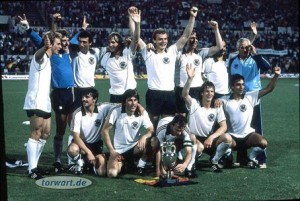 1980 ITALY
1980 ITALY
EUROPEAN CHAMPION – GERMANY
8 finalists were accredited for the first time, playing 14 games to crown the winner. Germany won the second title against Belgium.
Albania still did not join.
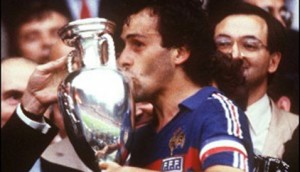 1984 FRANCE
1984 FRANCE
EUROPEAN CHAMPION – FRANCE
The star of 1984 was Michel Platini. The captain of the „équipe tricolore“ scored 9 goals (still the EURO record!), the last one of the tournament was the free kick to the leading goal in the final against Spain. A triumph in their home country, France couldn’t stop celebrating!
Albania joined the qualification but lost against Germany.
1988 GERMANY
EUROP. CHAMPION – THE NETHERLANDS
The Dutch forwarder Marco van Basten was the hero of this tournament. After scoring the leading goal in the 88th minute against Germany he also scored the winning goal in the final against the Sowjet Union by a Volley from an acute angle.
Albania’s group-oponent was once again Austria, but both lost already in the qualification phases.

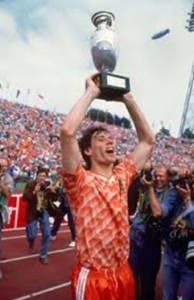
1992 SWEDEN
EUROPIAN CHAMPION – DENMARK
Yugoslawia was qualified but because of imposing sanctions by the UN on the balkan country they were excluded to participate. Denmark was renominated. The players all returned from their vacations and without the normal preparation period they won the tournament sensationally!
Albania failed in the qualification against France.
1996 ENGLAND
EUROPIAN CHAMPION – GERMANY
For the first time the European Championship was battled by 16 nations. The final was historic! Oliver Bierhoff scored the first Golden Goal ever! Germany won against the Tzech Republic 2:1 in the prolongation.
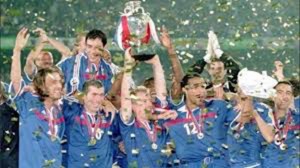 2000 BELGIUM & THE NETHERLANDS
2000 BELGIUM & THE NETHERLANDS
EUROPIAN CHAMPION – FRANCE
The final round in 2000 was a revision of the one in 1996; there was again the Golden Goal deciding about the winner! David Trezeguet scored the goal for France. In the last minute of the normal schedule he equalized against Italiy who dominated the whole match. Once again the proof that even in the last minute the game is still on and can always be changed!
Unfortunately Albania failed again in the qualification against Slovenia and Norway.
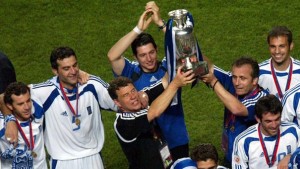 2004 PORTUGAL
2004 PORTUGAL
EUROPIAN CHAMPION – GREECE
How to beat the big players was demostrated in 2004 by the outsider Greece. Coached by the German Otto Rehagel they achieved the final against the hosting team Portugal. As already demonstrated in the opening match they won again against a team with superstars like Cristiano Ronaldo and Luis Figo.
Fans betting on Greece were very lucky!
Switzerland and Russia beated Albania in the qualification phases so that the Eagles had again to stay at home.
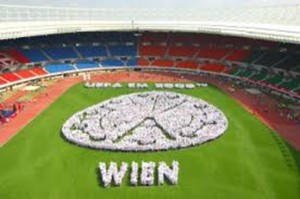 2008 AUSTRIA & SWITZERLAND
2008 AUSTRIA & SWITZERLAND
EUROPIAN CHAMPION – SPAIN
Germany and Spain achieved the final. After 44 years Spain won finally again an internarional tournament and started a serie of trophies….2 years later they won the FIFA World-Championship and also the next European Championship in 2012 in Poland & Ukraine. Albania could not participate because of failing in the qulification phases against Rumania and The Netherlands.
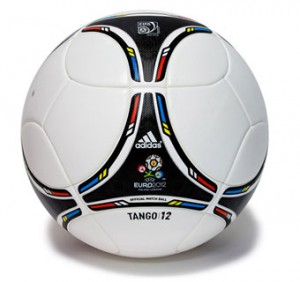 2012 POLAND & UKRAINE
2012 POLAND & UKRAINE
EUROPEAN CHAMPION – SPAIN
For the first time the European Championship was located in former Eastern Europe countries. An important symbol for the new Europe! Spain won with an enourmous score of 4:0 against Italy in the huge new stadion of Kiew. The crowned Topscorer was once again Fernando Torres, the only player who scored at two finals of European Championships!
Albania could not achieve the final round, but they will be part of the next!!!!!!!










